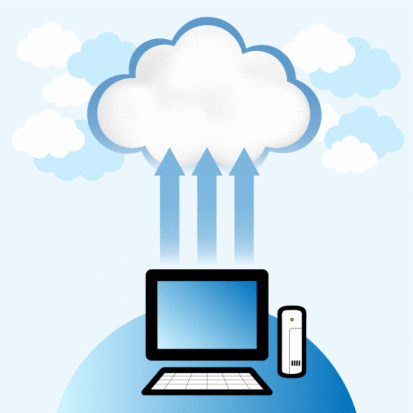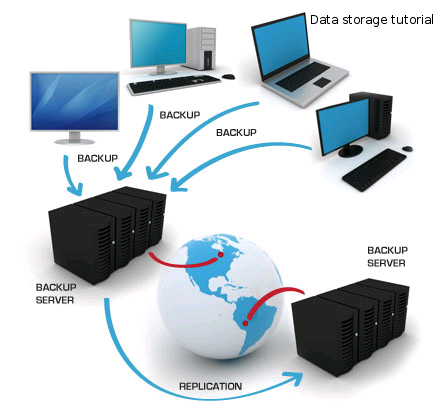Assess need, compare vendors &
select a service
All enterprises understand how important it
is to back up data, but they may not all be aware of cloud- based offerings
that can save internal resources as well as help lower the IT budget related to
data storage. For some companies, it's a simple matter of not wanting to move
away from traditional backup approaches. For others, it's about worrying that
the services are too complicated and potentially risky. Whatever the reason, you
may be missing out on the many benefits these services provide.

SMBs
& Cloud-Based Backups
Advantages & disadvantages of cloud
backups
One of the biggest benefits of cloud-based
backups is that they don't consume onsite resources and instead are housed at
an offsite facility. According to Rachel Dines, senior analyst with Forrester
Research (www.forrester.com). with PC-based backups, vendors are introducing
new features all the time. Generally, backups are non-disruptive, continuous,
and provide the ability to still work with open files even as they are being
backed up. She points out that these backups can sometimes be accessed from
smartphones and tablets, even if the data was originally backed up on a
desktop or laptop.
Ileana Funez, research analyst with
Info-Tech Research Group (www.infotech.com), says that on the server side,
where companies are backing up a larger amount of data from multiple systems,
one benefit is that there is "very little management overhead that goes
into it." Many vendors also offer redundant storage features and provide
"a good amount of security for the long-term availability of data,"
she says.
However, there are a few drawbacks with
cloud-based backups that you should be aware of. For one, you are putting
potentially sensitive data in the hands of a third-party source and if you
aren't fully aware of their security practices, you could be putting that
information at risk.
Pricing can also be an issue because it
"is based on capacity and the one thing companies really have to look out
for is overage fees," says Funez. If you sign up for a certain capacity
and then exceed that limit, you could be hit hard by additional charges that
negate any potential savings. But most of these problems can be overcome by
doing your due diligence up front and understand what exactly it is you're
paying for.
What to look for in vendors &
services
Research is one of the key aspects of
choosing any product or service and that's why it's so important to compare
multiple cloud computing vendors before signing an agreement. You not only
need to know the features of their specific offering, but also whether or not
it is a fit for your data backup needs.
"From a technology perspective, you
want to know what they are going to do to help with data reduction and
bandwidth efficiency," says Dines. "You want to make sure that the
backups aren't going to take a really long time and stall up your systems and
that you aren't going to be paying high network costs because the backups are
really large."
Next to the technology itself, you also
need to be aware of the vendor's security practices, find out what types of
data loss prevention solutions they have in place, and also learn about the
data retention policies. "How long is data kept?" says Dines.
"Can that be customized for the particular needs of my organization? Can
I choose between a 30-, 60-, 90-day retention? Those are the basics that you
want to look for."
Disaster recovery & business
continuity considerations
Another huge benefit of cloud-based backup,
and something that every company needs to know about before making the plunge,
is that these types of online services are perfect for disaster recovery and
business continuity.
"We're starting to see some of the
online backup providers also offer cloud disaster recovery," says Dines.
"You're backing up to them and if you lost your primary data center, you
could recover in the cloud using your backups to their data center."
However, Dines warns that you can't abandon
having a disaster recovery plan in place just because you have backups stored
off-site. "You still have to have a way to recover that data and those
systems to alternative hardware and an alternate location," she says.
That's why it's important to maintain great communication with your vendor
from beginning to end and ensure that you will be covered in case of a data
loss event.

you
should always have an on-site backup solution in place for your mission-critical
data
Backup considerations
In terms of what should be backed up, Funez
and Dines have slightly different views. Funez says that companies should
mainly focus on backing up data that is "difficult to replace," such
as ERP, CRM, and email data as well as finance databases and HR systems. Dines
agrees that it's important to back up mission-critical data, but that you also
need to back up everything else as well. But if that seems to be unreasonable
and potentially expensive, she says companies can't counteract it by
minimizing data retention.
If you can get retention times down to 30
days or less, that's going to save you a significant amount of money,"
says Dines. "The majority of backups needs to be restored from the past
couple of days, not from a month ago. The likelihood that you'll need a backup
from even 30 days, 60 days, or 90 days is pretty low. To save on costs, you can
cut those retention times down."
Take a hybrid approach
If you're still not sure whether or not a
cloud-based backup approach is right for you, consider dipping your toe in the
water instead of diving in head first. Dines says that small organizations
have the possibility of using the cloud as their sole backup solutions, but
that "as you get into larger companies and larger amounts of data, it's
very useful to have a local stop."
Funez agrees, saying that you should always
have an on-site backup solution in place for your mission-critical data, but
that you can use cloud-based backups for emergencies. She does say that
companies that use remote location should consider backing up directly to the
cloud, but for many companies, a hybrid approach is a great way to start using
the cloud without fully committing to it.